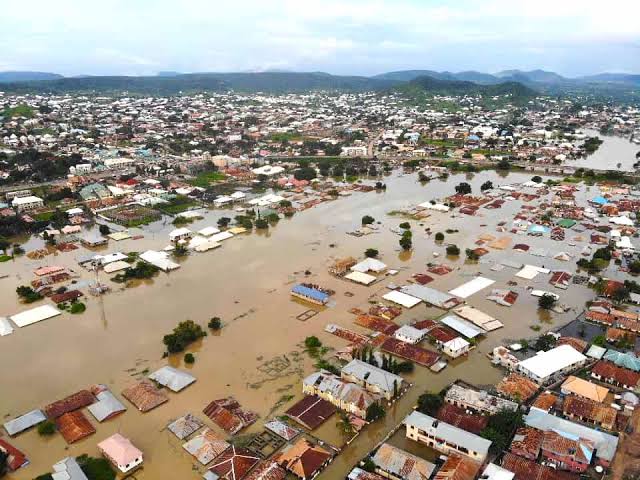The Nigerian Meteorological Agency (NiMet) has released a new flood alert for July 2025, warning that 20 states — including Sokoto, Lagos, Edo, and Benue — may experience flash flooding in the coming weeks due to continuous rainfall across the country.
Despite the disbursement of over N620bn in ecological funds over the last decade, many of these states appear to be unprepared for the expected flooding, sparking public outcry and scrutiny of how these funds are managed.
Climate researchers, urban planning experts, and civil society groups are now raising urgent concerns about the state governments’ level of commitment to protecting lives and property.
NiMet’s advisory listed Sokoto as having the highest risk, while other states such as Kaduna, Yobe, Bayelsa, Delta, and Cross River also face major threats. The agency urged residents to take precautionary steps, including evacuating flood-prone areas, clearing blocked drainage systems, and staying alert during heavy rainfall.
In Ondo State, communities like Uso, Ilaje, Okitipupa, and Ese Odo are already battling the aftermath of heavy rains last weekend. Houses have been submerged, roads washed away, and families left stranded. Victims say the flooding was worsened by poor drainage and overflowing streams.
Mr. Joshua Jemiloni, a resident of Okitipupa, said, “The flooding was caused by erosion flowing down from Igodan, coupled with the fact that the Igodan stream along the road overflowed its banks during the torrential downpour. It affected about 10 buildings.”
Another resident, Lawrence Awanebi, described the scene as devastating and appealed for urgent help from the state and federal governments. Owo Local Government Chairman, Tope Omolayo, also made a public call for emergency assistance.
Ondo State Governor, Lucky Aiyedatiwa, noted ongoing efforts to prevent further disasters. “As a government, we shall continue with initiatives that will reduce the effects of floods and other natural disasters by dredging our waterways and enforcing environmental sanitation laws,” he said.
According to reports, all 36 states from 2012 to February 2025, received a combined N622.15bn from the Ecological Fund. These funds were meant to address environmental threats such as erosion, flooding, and drought. However, many critics argue that the funds have not been used efficiently.
According to Afolabi Abiodun, President of the Africa Environmental Health Organisation, “The government claims to be trying, but frankly, we don’t see the impact on society… You see, for me, the issue lies in accountability and transparency; both are missing.”
Environmental expert Hakeem Mukhtar expressed similar concerns: “From a practical standpoint, many communities are still without effective drainage systems… We’ve also seen little transparency or accountability in how ecological funds are allocated and utilized.”
Former Nigerian Institute of Town Planners President, Nathaniel Atebije, noted a critical unfulfilled agreement with Cameroon involving the construction of a middle dam that could have reduced flooding along the River Benue.
“Now, these things are not done. These medium-level dams are not done. And so, whenever water is released from the dams, the downstream people will greatly suffer from flooding,” he said.
Climate researcher Abeeb Ajagbe added that while some states have tried to improve flood defences, much remains undone. “At the moment, what the fund is being used for is clearly not enough, and it is not even measurable,” he said.
A recent report from SBM Intelligence showed that since July 2024, 31 of Nigeria’s 36 states have been affected by floods, impacting 1.2 million people and wiping out 180,000 hectares of farmland. These floods have worsened food insecurity and driven inflation across the country.
Data from May 2025 alone recorded over 116,000 people affected by floods in just 12 states. Zamfara was the worst hit, with 58,386 victims, followed by Kwara, Lagos, and Enugu. In the Niger Delta, Bayelsa State reported over 5,000 victims due to rising river levels.









